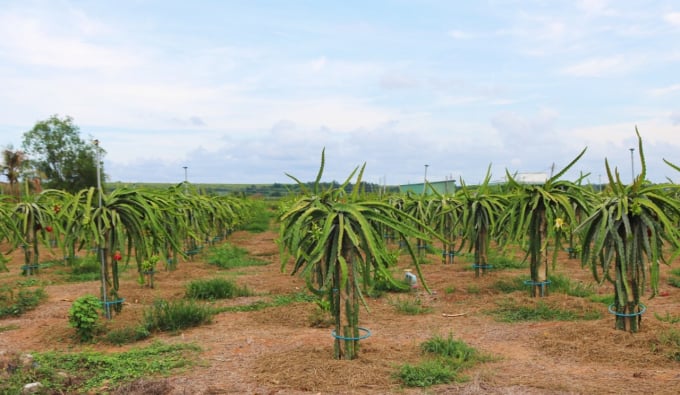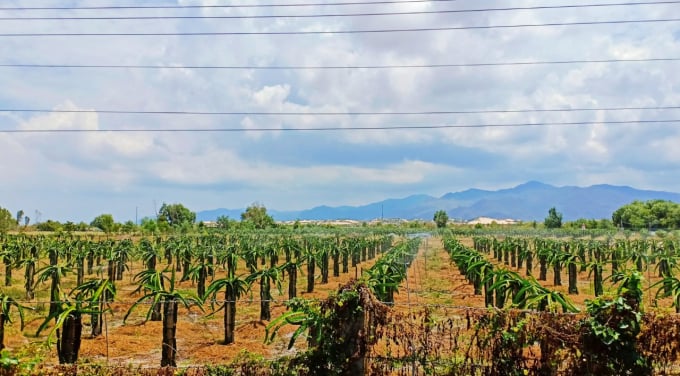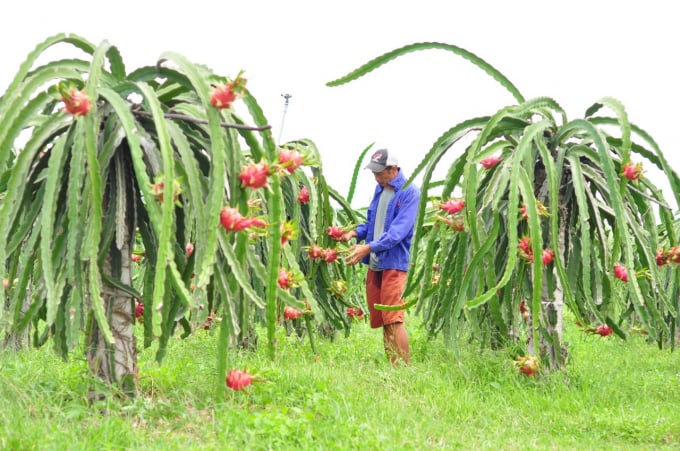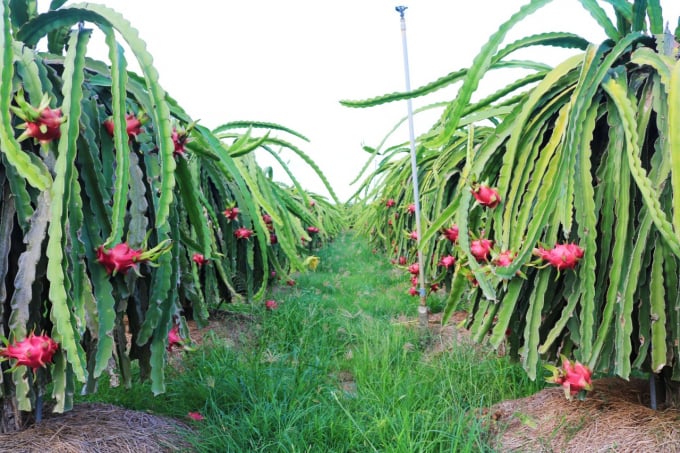May 24, 2025 | 16:27 GMT +7
May 24, 2025 | 16:27 GMT +7
Hotline: 0913.378.918
May 24, 2025 | 16:27 GMT +7
Hotline: 0913.378.918
Binh Thuan is situated in one of the most arid regions of the nation, with two distinct seasons: wet and dry. While the province's overall reservoir capacity remains small. Water scarcity for living and production is often the consequence, hurting people's lives and livelihoods.

Many dragon fruit gardens in Binh Thuan province are widely applied with drip irrigation technique. Photo: KS.
According to Nguyen Huu Phuoc, Deputy Director of the Binh Thuan Department of Agriculture and Rural Development, adapting to harsh weather conditions and climate change, effectively utilizing water for agricultural production, and ensuring the area's agricultural economy's stable development are critical tasks.
Apart from that, the province develops an adequate timetable for agricultural production to prevent adverse weather and hydrological effects; and to change the structure of plants to adapt to dry conditions. Additionally, it takes proactive steps to guarantee enough water supplies for production, including the use of cutting-edge and cost-effective plant irrigation technology.

Farmers belive that economical irrigation helps to reduce costs and increase crop yields. Photo: KS.
According to farmers in Binh Thuan province, modern, water-saving irrigation increases crop production by 25% and reduces labor expenses associated with irrigation and maintenance by 30%. Specifically, the quantity of water saved is between 40% and45% when compared to conventional irrigation methods.
Mr. Tran Hao, a resident of Ham Minh commune, has achieved excellent results with the use of drip irrigation in conjunction with soluble fertilizer delivery using Israeli technology on 5 hectares of dragon fruit. When his family uses drip irrigation technology, it takes just one laborer and three hours to irrigate all dragon fruit pillars. Additionally, plants can absorb 70-80% of nutrients in a technologically advanced way, compared to about 30% in a manual method. Particularly, the timing of fertilization is entirely proactive, making it timely. As a consequence, agricultural production rose; on average, each family dragon fruit pillar received 50kg/year, compared to 40kg/pillar/year in the previous.
Continue to increase the area covered by drip irrigation
According to the head of Binh Thuan's agriculture department, the province encourages municipalities to publish policies and programs encouraging farmers to use sophisticated and drip irrigation techniques for plants cultivated in shallow soil.

Dragon fruit garden applies economical irrigation for better productivity. Photo: MH.
Additionally, the agriculture sector integrates popular information and guidance on modern and water-efficient irrigation technology on an annual basis. Additionally, propagate the State's guidelines and policies on advanced irrigation and water conservation for upland crops via a campaign of promotion and distribution of the State's policies and laws in the area of management. Utilize irrigation works to ensure that everyone is aware of them and can apply them to production.
Additionally, the Department charged the Agricultural Extension Center with coordinating with the province's People's Committees, districts, towns, and cities to develop pilot models using modern irrigation technology to save agricultural water. Determine whether elements of the pilot model are successful for replication in production based on the outcomes of the pilot model deployment...

Binh Thuan province will continue to spread the models of economical irrigation for crops. Photo: KS.
To further develop and expand the models, leaders of the Binh Thuan Department of Agriculture and Rural Development said they will continue to promote communication, dissemination, and introduction of agricultural production models that utilize advanced and water-saving irrigation methods in the coming years.
Simultaneously, open training courses and propaganda to increase public awareness of advanced and water-saving irrigation methods; construction of models, demonstration models of smart agriculture associated with advanced irrigation technology and water conservation; implementation of advanced and water-saving irrigation models and projects for small-scale production and households that are integrated into public infrastructure.
" Binh Thuan province's agriculture industry will continue to study and develop new ways to save irrigation. For instance, developing a cost-effective irrigation system with incentives and preferential regulations for farmers to qualify for favorable bank loans to invest in technology installation. On the other hand, local levels and branches must increase their collaboration with institutes, universities, and research organizations in the creation and transmission of modern technology that is cheap in investment and simple to implement at the level of farmers. Only then can the model's replication in Binh Thuan provide superior outcomes "Deputy Director Nguyen Huu Phuoc of the Binh Thuan Department of Agriculture and Rural Development said.
Translated by Linh Linh

(VAN) The People's Committee of Tra Vinh province has approved an adjustment to the investment policy for the Green Hydrogen Plant project, increasing its area to approximately 52.76 hectares.
![Reducing emissions from rice fields: [2] Farmers’ commitment to the soil](https://t.ex-cdn.com/nongnghiepmoitruong.vn/608w/files/news/2025/05/05/dsc08881jpg-nongnghiep-140632.jpg)
(VAN) Clean rice cultivation model in Thuong Tan commune, Bac Tan Uyen district, is assisting local residents in achieving sustainable agriculture by substantially reducing costs, increasing productivity, and protecting the environment.

(VAN) At the conference to disseminate Resolution No. 68, AgriS introduced its digital agricultural ecosystem and reaffirmed its commitment to accompanying the Government in promoting private sector development and sustainable agriculture.

(VAN) 'Blue Ocean - Blue Foods' initiative is designed to restore marine ecosystems and establish sustainable livelihoods for local communities by cultivating a minimum of 1,000 hectares of cottonii seaweed in the first three years.
/2025/05/21/4642-3-112707_603.jpg)
(VAN) The V-SCOPE project has made direct contributions to three out of six pillars of the Comprehensive Strategic Partnership between Vietnam and Australia.

(VAN) Facing the threat of rabies spreading to the community, Gia Lai province urgently carries out measures to vaccinate dogs and cats on a large scale.

(VAN) Disease-free livestock farming not only protects livestock herds but also stabilizes production and livelihoods for many farmers in Tuyen Quang.